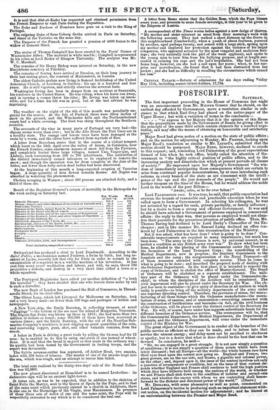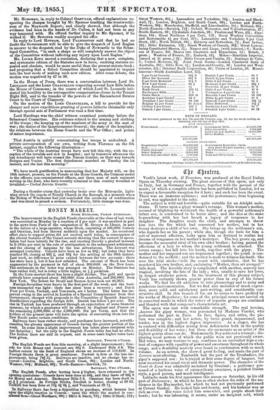POSTSCRIPT.
SATURDAY.
The first important proceeding in the House of Commons last night was an announcement from Mr. MILNER GIBBON that he should, on the earliest day afforded by Government, move a resolution similar in sub- stance to that which Earl Grey had placed on the notice-paper of the Upper House ; but with a variation of terms in the conclusion- - - - - " to express to her Majesty that it is the opinion of this House that the propositions made' by the Government of Russia for giving effect to the principle of the same third article contain elements for a renewed nego- tiation, and may offer the means of obtaining an honourable and satisfactory peace.' Reed had given notice of a motion on the state of public affairs ; and on the motion for adjourning to Mondiy, Mr. FRENCH, looking upon Major Reed's resolution as similar to Mr. Layard's, submitted that the motion should be -postponed. Major REED, however, declined to accede to this request ; and, reminding Lord Palmerston of the great expectations formed of him when he took office, briefly called the attention of Go- vernment to "the highly critical position of public affairs, and to the increasing anxiety and dissatisfaction which at present pervade all classes of society." He impressed upon her Majesty's Government "the wis- dom of immediately anticipating those consequences which are certain to arise from continual popular demonstrations, by at once introducing such reforms in every branch of the state as are consonant with the intelli - gence of the age and the just demands of the people." He would not further trespass on the time of the House, but he would address the noble Lord in the words of the poet Milton—
"Awake, arise, or be for ever fallen!"
Lord Paefseasrces rose. It was true, he said, that public expectation had
overrun the bounds of reasonable and practicable execution when he was called upon to form a Government. In selecting his colleagues, he was not actuated by a regard for rank, private partiality, or family influence ; but by a desire to form a strong and efficient Government. It was said he should have selected a Government of persons-employed in commercial affairs the reply to that was, that persons so employed would not aban- don their pursuits for the precarious situation of public office. Thus, Mr. Thomas Baring had declined to be Lord Derby's -Chancellor of the Ex- chequer ; and in like manner Mr. Samuel Laing declined an office ten- dered by Lord Palmerston in the late reconstruction of the Ministry.
But it was asked, what has been done ? what is going to be done ? Con- siderable improvements are required in many departments ; but much has
been done. The army in the Crimea is now, by universal consent, in as perfect a condition as any British army ever was." To show what has been done, he alluded to the placing of the Commissariat under the Treasury ; the formation of the land Transport Corps ; the remodelling of the Medical Department, now in progress; the Sanitary Commission to the hospitals and the camp ; the reorganization of the Naval Transport—all of them measures attended with complete success. Then he came to what is going to be done ; and described the proposed mode of dealing with the Ordnance Department. In the first place, it is intended to remodel the corps of Ordnance, and to abolish the office of Master-General. The Board of Ordnance will be abolished as a separate establishment. The mili- tary part of the Ordnance will be placed under the Commander-in- chief; to whom the discipline of the Artillery will be transferred. The civil department will also be placed under the Secretary for War. The ob- ject has been to centralize—to give unity of direction in all matters in which unity is possible—to bring all the military departments of the army under one supreme directing control. Therefore, the provision of stores, the menu- facturing of all those things which the Ordnance manufacture—the manu- facture of arms, of cannon, and of ammunition—everything connected with the construction of fortifications and barracks—in fact, all the civil business of the Ordnance, will be placed under the distinct control of the Secretary for War. • He will, of course, have under him separate subordinate heads for the different branches of the Ordnance service. The consequence will be, that the Commissariat Department, the Medical Department, the Department of Accounts, and the Ordnance Department, will come under the immediate control of the Minister for War.
The great object of the Government is to render all the branches of the public service as efficient as they can be made, and to infuse into that service the utmost energy ; and delay must not be ascribed to slackness or apathy, but to a desire that what is done should be the best that can be devised. In conclusion, he said- " Sir, we are engaged in a great struggle. It is not now simply a question
of conditions ; it is not simply a question of those points which have been lately discussed ; but all Europe—all the world—the whole human race have their eyes fixed upon the contest now going on. England and France, two great powers, are on the one side, and Russia, a gigantic and colossal power, on the other ; and, depend upon it, the issue of the contest involves not only a question of arrangement or condition, but on the issue of that contest de- pends whether England and France shall continue to hold the high position which they have hitherto held among the nations of the world, or whether we and France shall sink down to the condition of inferior and second-rate states, and whether the enemy with whom we are contending shall hence- forward be the dictator and dominant power of the -world." (Cheers.) Mr. DISRAELI, with some pleasantry as well as point, commented on Lord Palmerston's tactics in producing such an important statement with- out notice, on the incidental motion for adjournment ; and he hinted at an understanding between the Premier and Major Reed. Mr. 171013SMAN, in reply to Colonel .Gruevu.r.a, offered explanations re- specting the charges brought by Mr. Spooner touching the trustworthi- ness of the Maynooth Report; and clearly showed, that although the evidence had been in the hands of Dr. Cullen, it had not been in any way tampered with. He offered further inquiry to Mr. Spooner, if he wished it. Mr. SPOONER readily accepted the offer. In reply to Lord HOTHAM, Lord PALMERSTON said that he had no doubt the Government will be able to give the despatch of Lord Raglan in answer to the despatch read by the Duke of Newcastle to the Sebas- topol Committee, "in such a shape as will completely answer the object of the Committee without inflicting any injury upon Lord Raglan."
Mr. Loma lines moved a resolution, declaring that a new, ooinplete, and systematic edition of the Statutes now in force, omitting statutes re- pealed and obsolete, would be more useful than the present statute-book ; and proposing that a Select Committee should be appointed to inquire into the beat mode of making such new edition. After some debate, the motion. was negatived by 47 to 38.
In the House of Peers, there was a conversation between Lord ST. LEONARDS and the Loan CHANCELLOR respecting several Law Bills before the House of Commons; in the course of which Lord St. Leonards inti- mated his hostility to the retrospective compensation-clause in the Tenant Right Bill, and to the transfer of the powers of the Encumbered Estates Court to the Court of Chancery.
On the motion of the Loan Onssicantem, a bill to provide for the cheaper and more expeditious granting of powers hitherto obtainable only through special acts of Parliament was read a first time.
Lord Hardinge was the chief witness examined yesterday before the Sebastopol Committee. His evidence related to the arming and clothing of the troops ; the keeping up of the numbers of the army at the seat of war; the duties of the Quartermaster-General; the state of the hospitals ; the relations between the Horse Guards and the War Office ; and points of minor importance.



























 Previous page
Previous page